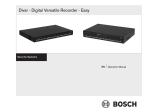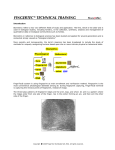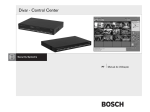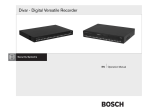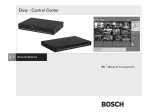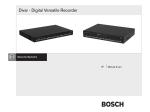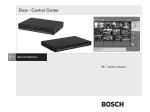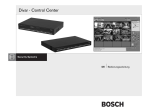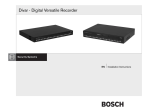Download Bosch Divar Instruction manual
Transcript
Divar - Control Center EN Operation Manual EN | 1 Divar Digital Versatile Recorder Divar Control Center Operation manual Contents Getting started. . . . . . . . . . . . . . . . . . . . . . . . . . . . . . . . . . . . . . . . . . . . . . . . 3 Introducing the main window . . . . . . . . . . . . . . . . . . . . . . . . . . . . . . . . . . . . 7 Viewing live images . . . . . . . . . . . . . . . . . . . . . . . . . . . . . . . . . . . . . . . . . . . 10 Finding recordings for playback . . . . . . . . . . . . . . . . . . . . . . . . . . . . . . . . . 15 Handling recordings . . . . . . . . . . . . . . . . . . . . . . . . . . . . . . . . . . . . . . . . . . 24 Bosch Security Systems English Divar Control Center | Operation Manual English Divar Control Center | Operation Manual | EN | 2 Getting started . . . . . . . . . . . . . . . . . . . . . . . . . . . . . . . . . . . . . . . 3 System requirements . . . . . . . . . . . . . . . . . . . . . . . . . . . . . . . . . . . . . . . . . . Software installation . . . . . . . . . . . . . . . . . . . . . . . . . . . . . . . . . . . . . . . . . . . Conventions used in the application . . . . . . . . . . . . . . . . . . . . . . . . . . . . . . How to Log in . . . . . . . . . . . . . . . . . . . . . . . . . . . . . . . . . . . . . . . . . . . . . . . . 3 4 4 5 Overview tab . . . . . . . . . . . . . . . . . . . . . . . . . . . . . . . . . . . . . . . . . . . . . . . . Search tab . . . . . . . . . . . . . . . . . . . . . . . . . . . . . . . . . . . . . . . . . . . . . . . . . . Smart Motion Search tab . . . . . . . . . . . . . . . . . . . . . . . . . . . . . . . . . . . . . . ATM/POS tab . . . . . . . . . . . . . . . . . . . . . . . . . . . . . . . . . . . . . . . . . . . . . . . Protected tab . . . . . . . . . . . . . . . . . . . . . . . . . . . . . . . . . . . . . . . . . . . . . . . . 17 19 20 22 23 Handling recordings . . . . . . . . . . . . . . . . . . . . . . . . . . . . . . . . . . 24 Introducing the main window. . . . . . . . . . . . . . . . . . . . . . . . . . . . 7 System settings . . . . . . . . . . . . . . . . . . . . . . . . . . . . . . . . . . . . . . . . . . . . . . . Live button for multiple Divars . . . . . . . . . . . . . . . . . . . . . . . . . . . . . . . . . . . Playback button for single Divar . . . . . . . . . . . . . . . . . . . . . . . . . . . . . . . . . Config button. . . . . . . . . . . . . . . . . . . . . . . . . . . . . . . . . . . . . . . . . . . . . . . . . Help button . . . . . . . . . . . . . . . . . . . . . . . . . . . . . . . . . . . . . . . . . . . . . . . . . . Logout button . . . . . . . . . . . . . . . . . . . . . . . . . . . . . . . . . . . . . . . . . . . . . . . . Checking status information. . . . . . . . . . . . . . . . . . . . . . . . . . . . . . . . . . . . . Checking alarms . . . . . . . . . . . . . . . . . . . . . . . . . . . . . . . . . . . . . . . . . . . . . . Selecting Divars, cameras, groups and views . . . . . . . . . . . . . . . . . . . . . . 7 7 7 8 8 8 8 8 9 Viewing live images . . . . . . . . . . . . . . . . . . . . . . . . . . . . . . . . . . 10 Assigning cameras to cameos . . . . . . . . . . . . . . . . . . . . . . . . . . . . . . . . . . Making groups. . . . . . . . . . . . . . . . . . . . . . . . . . . . . . . . . . . . . . . . . . . . . . . Making views . . . . . . . . . . . . . . . . . . . . . . . . . . . . . . . . . . . . . . . . . . . . . . . . Camera views . . . . . . . . . . . . . . . . . . . . . . . . . . . . . . . . . . . . . . . . . . . . . . . Capturing a still image . . . . . . . . . . . . . . . . . . . . . . . . . . . . . . . . . . . . . . . . Instant playback. . . . . . . . . . . . . . . . . . . . . . . . . . . . . . . . . . . . . . . . . . . . . . Controlling cameras . . . . . . . . . . . . . . . . . . . . . . . . . . . . . . . . . . . . . . . . . . 10 10 11 11 12 12 12 Finding recordings for playback . . . . . . . . . . . . . . . . . . . . . . . . 15 Selecting a camera . . . . . . . . . . . . . . . . . . . . . . . . . . . . . . . . . . . . . . . . . . . The playback viewing window . . . . . . . . . . . . . . . . . . . . . . . . . . . . . . . . . . Using the playback controls . . . . . . . . . . . . . . . . . . . . . . . . . . . . . . . . . . . . Capturing a still image . . . . . . . . . . . . . . . . . . . . . . . . . . . . . . . . . . . . . . . . Bosch Security Systems 15 15 16 17 Protecting recordings . . . . . . . . . . . . . . . . . . . . . . . . . . . . . . . . . . . . . . . . . Checking authenticity . . . . . . . . . . . . . . . . . . . . . . . . . . . . . . . . . . . . . . . . . Archive recordings to a PC hard disk . . . . . . . . . . . . . . . . . . . . . . . . . . . . Exporting video clips . . . . . . . . . . . . . . . . . . . . . . . . . . . . . . . . . . . . . . . . . . Unprotect a protected recording . . . . . . . . . . . . . . . . . . . . . . . . . . . . . . . . Deleting recordings . . . . . . . . . . . . . . . . . . . . . . . . . . . . . . . . . . . . . . . . . . . 24 24 24 25 25 25 EN | 3 Getting started The Control Center gives you full remote control of a Divar using a PC. Any Divar connected to the network can be controlled and multiple-user access is available for up to six people. Multiple Divars can be controlled simultaneously. Remote live viewing, search, playback and system configuration are provided. Remote control functions include pan, tilt and zoom control of cameras (including full AutoDome™ control) and video archiving. An on-line status overview of the connected Divar is also provided. Access to the Configuration Tool to set up a Divar is restricted to the system administrator and can be password protected. The configuration can restrict the functions available to each remote user, for example, the ability to archive or export video. See the Divar Instruction manual for more information. Search and playback functions can also be blocked by the administrator, so it is possible they are not directly available. All possible operator facilities are described in this manual but some of these may not be available to you. An Archive Player is provided so that archived video recordings can be viewed outside the Control Center application without requiring any installation. All recordings have an code embedded in them. This makes it possible to check their authenticity to ensure that they have not been tampered with. You can view, record and search ATM/POS transaction data of a selected Divar if it has an ATM/POS bridge unit and a license. For more information please visit: www.boschsecuritysystems.com Bosch Security Systems System requirements Operating platform: A PC running Windows 98, Windows Millennium, Windows NT 4.0 (SP4), Windows 2000 or Windows XP (Windows 2000 or higher recommended) with IE4.0 or higher. For the Control Center, the minimum PC requirements are: • • • • Processor: RAM memory: Free hard disk space: Video system: • Network interface: 450 MHz Pentium II (or equivalent) 128 MB* 50 MB 8 MB video memory, 800x600 with16-bit color. A 1024x768 display with 24-bit color or more is desirable. 10-BaseT (100-BaseT desirable) For the Archive Player, the minimum PC requirements are: • • • • Processor: RAM memory: Free hard disk space: Video system: 450 MHz Pentium II (or equivalent) 64 MB* 10 MB 800x600 with 16-bit color For the Configuration Tool, the minimum PC requirements are: • • • • • * Processor: RAM memory: Hard disk space: Video system: Connectivity: 200 MHz Pentium with MMX (or equivalent) 32 MB* 15 MB free 800x600 with 16-bit color A free RS232 port or a 10/100-BaseT network interface. depends on operating system. English Divar Control Center | Operation Manual | Getting started English Divar Control Center | Operation Manual | Getting started Software installation 1. Insert the CD-ROM into the CD-ROM drive on your PC. > The installation program should start automatically. 2. If installation does not start automatically, locate the Setup.exe file on the CD and double click it. 3. Follow the instructions on the screen to complete the installation. Starting the program When installation is complete, double click the Divar Control Center icon on your desktop window to start the program. Alternatively, select the Divar Control Center program via the Start button on the task bar and the Programs menu item. Conventions used in the application Interpreting icon colors • Disabled functions are shaded. EN | 4 Progress bar • A progress bar is displayed when a task that takes some time to complete is running. • Click Cancel to stop the task. Confirmation window A confirmation window is displayed when an irreversible operation is selected. • Click Yes to proceed with the operation. • Click Cancel to abandon the operation. Error window An error window is displayed whenever an error occurs. • Click OK to dismiss the error notification. Refresh Status indications are updated regularly. The earliest and latest recording times are updated following deletion of video. Disk space usage is updated following deletion of video or after protection of video against overwriting. • Active selections are colored yellow. Expand/collapse lists Calendar window In the System Management window, the tree structure shows a + or a - next to an icon. Click the + to expand the list; click the - to collapse the list. The calendar window is displayed after clicking the calendar icon in windows where a date must be filled in. • Click the arrow keys to change months. • Click a date to return to the date box with the selected value filled-in. Lists • In lists, click a column header to sort the list according to that column item. • Click a second time to sort the list in reverse order. • Use the scroll bars to scroll through long lists. Bosch Security Systems EN | 5 How to Log in When the Control Center application is started for the first time, the user name and password boxes are blank. The Divar list is also empty. You must first add one or more Divars to the list. To automatically detect all enabled Divars on the network: 1. Click Detect. > To detect a Divar, Discovery must be enabled on that Divar. 2. Select the Divar(s) to be added. 3. Click OK to add the selected Divar(s) to the list. To add a Divar to the list click Edit >>. To modify the Divar list The Edit Divar list window allows you to add Divars to the list or delete Divars from the list. It also allows you to change the name and IP address of a selected Divar. To manually add a Divar to the list: 1. Click Add. 2. Enter the IP address or nickname of the new Divar. > The IP address to be filled-in is set in the System settings/Connectivity/Network setup menu of the Divar itself. Check with your administrator if you do not have access to the unit. 3. Type a name in the Name box or retrieve it from the Divar by checking the Retrieve from Divar box. 4. Click OK. To delete a Divar from the list: 1. In the list, select the Divar you wish to delete. 2. Click Delete. > The selected Divar is removed from the list. Bosch Security Systems English Divar Control Center | Operation Manual | Getting started English Divar Control Center | Operation Manual | Getting started EN | 6 Login Maximum number of users When you start the Control Center application, the Login window appears. (Click Cancel to discontinue login and exit the application.) The administrator can force off a user if the maximum number of users on a single Divar is reached. A list shows all users that are currently logged in. To disconnect a user: 1. Select a user in the list. 2. Click Yes. The software included with the product allows up to six users to log in at a time. If you are unable to log in, consult your administrator. To log in to a particular Divar: 1. Select the Divars you want to log in to by placing check marks next to them. > Click to either select all or none of the Divars listed. > If a login group has been defined, you can select this group to log in to the Divars listed in the group. 2. Type your user name and password. > The user name and password to be filled-in are set in the System settings/ Connectivity/Network access menu of the Divar itself. Check with your administrator if you do not have access to the unit. > To let the system remember your name and password on subsequent uses of the Control Center, place a check mark in the Save login information box. Administrator passwords are not saved. 3. Click Login. Bosch Security Systems EN | 7 Introducing the main window The live video window is shown when you log in. This is the main window. The top of the window has five buttons that are always available. 2. Place a check mark next to those items you want to activate. > The computer beeps on the specified alarms or maximizes the application window. 3. Select a sequence dwell time between 5 and 60 seconds to determine how long a sequenced view remains displayed. 4. Click OK to finish or Cancel to close the window without change. Live button for multiple Divars The live video window is shown when you click Live can: System settings • • • • • • • • The Control Center icon in the top left corner of the window allows you to manipulate window size, close the application or select system settings. Playback button for single Divar To change the system settings: 1. Click the system button and select the Settings item. > The system settings menu opens. Bosch Security Systems . On this screen you view live video select different multiscreen displays assign cameras to cameos open an instant playback window control cameras monitor unit status and alarm conditions log in to other Divars on the network set up logical groups and views The playback window is shown when you click Playback . In the playback window you can get a graphical overview of all recordings. You can also search for recordings based on events, motion or ATM/POS data and play them back, and manage protected recordings. English Divar Control Center | Operation Manual | Introducing the main window English Divar Control Center | Operation Manual | Introducing the main window EN | 8 Config button Checking alarms Click Config to start the configuration tool program. This allows you to set up all configuration settings for the unit. You must have administrator rights to access this program. An alarm condition causes the computer to beep or the Control Center window to pop-up when minimized if these features are set in the systems settings menu. Inspect the relevant video before acknowledging an alarm. A Divar can be set up to auto-acknowledge an alarm so that you do not have to respond to it. Help button If an alarm condition is not acknowledged after a pre-determined time, the alarm icon Click Help appears. no longer flashes, but continues to be shown. at any time to get help on any topic. A pop-up help window Acknowledging an input or video loss alarm 1. The alarm icon flashes when an alarm occurs. 2. Double-click the alarm message in the status message area or the Divar or camera icon in the System Management tree to acknowledge the alarm. Logout button > All alarms associated with that Divar are acknowledged. To disconnect from all conected units, click Logout . The login screen appears. Now you can choose to connect to a different unit or to exit the program completely by clicking Cancel. The status window at the bottom of the screen provides status messages from all Bosch Security Systems Acknowledging a motion alarm > All alarms associated with that Divar are acknowledged. Status area to collapse the status message area. . 1. The motion icon flashes when motion is detected. 2. Double-click the alarm message in the status message area or the Divar or camera icon in the System Management tree to acknowledge the alarm. Checking status information connected Divars including input and motion alarms. Click 3. The alarm icon goes back to its inactive state to enlarge or 3. The motion icon goes back to its inactive state . Locating an alarm A small alarm icon is placed in front of a Divar, a camera or a status message to help identify where the alarm is occuring. Selecting Divars, cameras, groups and views In the live mode, use the System Management window to select a Divar and open a list of connected cameras, or to set up groups of cameras and views and to recall them. These items are presented in a tree structure. In the tree structure, click + to expand a list; click - to collaspe a list. EN | 9 • Log in to or log off from a connected Divar or an entire group of Divars. • Acknowledge alarms on a particualar Divar. • View the properties of the selected Dviar, camera or camera view. Drop-down menu To jump directly to a top level group use the drop-down selection box to select a group from the list (ensure that Show Logical Groups is selected in the task menu). System Management icons Available Divars - Contains a list of all Divars defined on the network. Individual Divars - Shown in bold if you are logged in. Available cameras - Shows camera inputs available on a Divar. Connected cameras are displayed in bold. Controllable cameras - Shows controllable cameras connected to the Divar. Task menu Right click an item in the tree to open a task menu: • Place a check mark next to Show Login Groups or Show Logical Groups to see these items in the tree structure. • • • • Save the tree structure you have made to a file (Save). Load a tree structure that you have already saved to disk (Open). Make new groups and views, rename them or delete them. Copy logical groups (Save as . . . ). Bosch Security Systems Groups - Identifies a group. Views - Identifies a view. English Divar Control Center | Operation Manual | Introducing the main window English Divar Control Center | Operation Manual | Viewing live images EN | 10 Viewing live images 2. Click on a Divar. > Log in if necessary. 3. Click on the + beside the Divar name. > A list of connected cameras appears. 4. Click on the cameo where you want that camera picture to be shown. > A yelow border appears around the cameo. 5. Double click on a camera. > The camera picture appears in the cameo. You can also drag and drop cameras into cameo positions. To undo a cameo assignment: 1. Click on a cameo. 2. Click Remove . > The cameo is blank when the camera assignment is removed. Making groups A group is used to make a logical set of Divars, cameras or views that can easily be recalled. For example, all Divars at a specific building, or all cameras on one floor of a building. Groups can be nested and arranged so that you can immediately recall a logically named set. Views are placed under groups. Assigning cameras to cameos A cameo is a single camera picture in a multiscreen display. A camera picture can only be shown in one cameo at a time. To assign a camera to a cameo: 1. Click one of the camera view icons multiscreen view. Bosch Security Systems to select a To make a new group: 1. Select the position in the tree where you want the new group to appear. > Select the root icon to create a top level group. > A new group can also be nested under an existing group. 2. 3. 4. 5. Right click the tree item and select Add Group. Enter a name for the new group. Repeat this procedure to add more groups. Drag and drop the Divars, cameras and views you want in that group. Camera views To delete a group: 1. Select the group you want to delete. 2. Right click the group and select Delete. To switch the display mode: > All subgroups and views under this group are also deleted. Click one of camera view icons display configuration. To copy a group: 1. Select the group you want to copy. 2. Right click the group and select Save as. . . To select the sequence mode: Click the sequence icon Making views A view is a collection of camera to cameo assignments that can be recalled for instant live viewing. A view is always located under a group. Views should be groupped logically, for example, all cameras showing the entrances to a building. To make view: to select a > The cameras can be connected to different Divars. 3. 4. 5. 6. to change the cameo > Single, Quad, 3x3, 4x4, 5x5 and 6x6 multi-image display modes are available. > Enter a new name for the group. 1. Click one of the camera view icons multiscreen view. 2. Assign cameras to the cameos. EN | 11 Select the group where you want the new view to be stored. Right click a group and select Add View. Enter a name for the new view. To recall a particular cameo display, click on the view name. to start sequencing through a list of cameras. > If a group is selected in the System Management window, the Control Center sequences through all direct members of that group (but not subgroups). > If a view or camera is selected in the System Management window, the Control Center sequences through all direct members of that item’s parent group. > If a Divar is selected in the System Management window, the Control Center sequences through all cameras on that Divar in single mode. > If a single Divar or a Divar node is selected in the System Management window, the Control Center uses the dwell time set in the Divar being displayed. If a user-defined group is selected in the System Management window, the Control Center uses the dwell time set in the Control Center System Settings. To freeze the video stream 1. Click the freeze icon . > All displayed cameos are paused 2. Click the icon again to return to live viewing. Multiple quad views Four quad views are available. The current quad view is indicated by a number in the quad icon assignments. . Each quad view can have unique camera-to-cameo 1. To manually cycle through the available views, click the quad icon Bosch Security Systems . English Divar Control Center | Operation Manual | Viewing live images English Divar Control Center | Operation Manual | Viewing live images EN | 12 Capturing a still image Controlling cameras You can capture still images from the fullscreen display of a camera and save them to the PC hard disk in a bitmap format. A user can control controllable cameras by using the mouse on the cameo of the camera or by using the icons displayed under Camera Controls. To save an image from the active cameo to the PC hard disk: 1. Click the single icon 2. Click the snapshot icon to view the images from one camera. . Using the mouse to pan and tilt 1. Click the cameo of the camera you want to control to make it active. > It must be a controllable camera. > The Snapshot pop-up page appears. 2. Place the pointer on the active cameo (not in the center). 3. To change the default location, type the location in the PC file system where you want to store the image file. 4. To change the file name, type a new name for the file. 5. Click Save. > The pointer arrow indicates the direction in which the camera will move. 3. Click and hold the left mouse button. > The camera moves in the direction indicated. > Release the button when the camera is positioned. 4. Alternatively, drag the pointer in the direction you wish to move the camera. The snapshot has a resolution of 720x484 pixels in NTSC and 720x576 pixels in PAL. Authentication information is shown under the image. > Move the pointer horizontally to pan the camera and vertically to tilt the camera. Instant playback Pan and tilt speed depends on the position of the pointer on the cameo. The closer to the edge of the cameo you click, the faster the speed; the closer to the center, the slower the speed. To view the recorded video of a particular camera from one minute earlier: Using the mouse to zoom in or out 1. Click the cameo of the camera you want to play back to make it active. 1. To zoom in, place the pointer slightly above the center of the active cameo. 2. Click the Instant Playback icon . > A new window opens which playbacks the recorded video of this camera from one minute earlier. > Use the buttons at the bottom of the instant playback window to control playback or take a snapshot. > Click the x button in the top right corner of the instant playback window to close it. An alternative method of opening the instant playback window is to right click a camera in the System Management window and select Instant Playback. Bosch Security Systems > The pointer changes to a magnifying glass with a plus sign. 2. Click the left mouse button to zoom in. 3. To zoom out, place the pointer slightly below the center of the active cameo. > The pointer changes to a magnifying glass with a minus sign. 4. Click the left mouse button to zoom out. Zoom speed also depends on the position of the pointer with respect to the center of the cameo. An alternative method of zooming in and out is to use the scroll wheel of your mouse. Pan and tilt 1. 2. 3. 4. Select the cameo of the camera you want to control. Click and hold the up and down arrows for tilt. Click and hold the left and right arrows to pan. Click the lock-out icon to request exclusive control for PTZ, pre-position and aux commands of the active camera. 5. Click the lock-out icon again or select another active camera to unlock it. > When a user with higher priority requests exclusive privileges, the lower priority user loses control of the locked-out camera. EN | 13 3. Click the left focus button for near focus; click the right focus button for far focus. 4. Click the left iris button to close the iris; click the right iris button to open the iris. Moving a camera to a pre-position To move the active camera to a pre-position: 1. Enter a pre-position number. 2. Click Shot (or press enter). Click buttons one to five for immediate positioning to one of the first five prepositions. PTZ speed Drag or click the slider to adjust the speed of the PTZ controls. > There are eight discrete speed levels. To store the current position of the camera in a pre-position: 1. Enter a pre-position number. 2. Click Set. Aux functions Zoom, Focus, and Iris Aux commands are special commands for controlling AutoDome™ cameras. Zoom Focus Iris 1. Select the cameo of the camera you want to control. 2. Click the left zoom button to zoom out; click the right zoom button to zoom in. Bosch Security Systems To switch on the Aux command: 1. Enter an Aux number 2. Click Aux On (or press enter). 3. To switch off the Aux command, click Off. English Divar Control Center | Operation Manual | Viewing live images English Divar Control Center | Operation Manual | Viewing live images Activating output relays There are eight numbered positions that can be assigned to the output relays of the connected Divars. Place the pointer over one of these eight buttons to discover which Divar and relay it controls. To assign a numbered button to a relay: 1. Right click one of the numbered Outputs buttons > The configuration window opens. 2. Select a Divar from the list. > Only the output relays that are not assigned a specific function on that unit can be selected. 3. Select a relay for that Divar. To activate a relay: 1. Click one of the numbered Outputs buttons to activate or deactivate the output relay. > The buttons appear yellow for an active output and blue for an inactive output. Bosch Security Systems EN | 14 EN | 15 Finding recordings for playback The playback window is shown when you click Playback. The playback window has five tabs: • The Overview tab gives you a graphical overview of the video stored on the unit. • The Search tab allows you to search for recordings based on alarm and motion events. • The Smart Motion Search tab allows you to search for recordings based on motion in designated areas of a particular camera picture. • The ATM/POS tab allows you to search for recordings of transactions based on a text string. • The Protected tab allows you to manage protected recordings. The playback viewing window Selecting the playback viewing window size The playback viewing window has two sizes, normal and enlarged. Normal size contains the search criteria and results with the video in the upper left quadrant of the screen. With the enlarged size, the video occupies all of the center screen. Click the playback window size icon sizes. to switch between normal and enlarged Selecting single or multiscreen views In a normal sized playback window: Selecting a camera 1. Click the single icon Select a Divar from the Playback Divar drop-down menu at the top right of the screen. (If you select a Divar without an icon , the Login window appears.) Double-click a numbered camera icon to select it. Camera icons are shown in the top right of the screen in playback mode only. The camera icons show the number of the camera connection. The status and type of camera is indicated by the type of icon used. 2. Click the quad icon to view the images from one camera. to view the images of four cameras. > The 3x3 and 4x4 modes are not selectable. In an enlarged playback window: 1. Click one of the camera view icons display configuration. to change the multiscreen > Single, quad, 3x3 and 4x4 multi-image display modes are available. 2. To manually cycle through the available quad views, click the quad icon. Camera selected - Indicates the active camera (yellow icon). Camera not selected - Shows camera is available for selection. Camera not available - The camera is not physically connected or a user is blocked from using this camera by the administrator. Bosch Security Systems English Divar Control Center | Operation Manual | Finding recordings for playback English Divar Control Center | Operation Manual | Finding recordings for playback ATM/POS transactions Using the playback controls To view ATM/POS transaction data from a Divar it must have an ATM/POS bridge unit and a license installed. To view recorded transactions: 1. Click a cameo to select a particular camera. 2. Click the transaction icon . > The transacton viewer window opens. > The data associated with the selected camera is displayed in the viewer window. Cameo information The information line at the bottom of a normal-sized playback window shows the date and time of the playback video. The information line above the playback window shows the camera name and contains an information icon if paused. To see authenticity information about the current still image, click the information icon EN | 16 in the cameo. Play Click Play to play forward streaming video in the playback window. > The playback speed depends on the setting of the speed slider. > Some frames may be dropped depending on the bandwidth of the connection and the playback speed. Play Reverse Click Play rev to play streaming video in reverse in the playback window. > The playback speed depends on the setting of the speed slider. > Some frames may be dropped depending on the bandwidth of the connection and the playback speed. > When the beginning of a selection is reached, playback pauses. Click Play rev at this position to continue playback in reverse outside the selection. Playback Speed The slider controls the speed of the continuous reverse and continuous forward play. The All value means that no images are dropped at the fastest rate provided by the system. Still Click Still to freeze the image. > The last streamed image is shown as a still in the playback window. Step forward The step icon is only enabled in the still mode. 1. Click Step forward to advance the image one frame. 2. Hold it down to continue stepping. Bosch Security Systems Step backward EN | 17 Overview tab The step icon is only enabled in the still mode. 1. Click Step backward to move the image one frame back in time. 2. Hold it down to continue stepping. The overview tab window provides a graphical representation of the video recorded on the Divar storage system. You can playback this video or make a selection for protection, authenticity checking, archiving, export or deletion. Capturing a still image You can capture still images from the fullscreen display of a camera and save them to the PC hard disk in a bitmap format. To save an image from the active cameo to the PC hard disk: 1. Click the single icon 2. Click the snapshot icon to view the images from one camera. . > The Snapshot pop-up window appears. 3. To change the default location, browse to the location in the PC file system where you want to store the image file. 4. To change the file name, type a new name for the file. 5. Click Save. The snapshot has a resolution of 720x484 pixels in NTSC and 720x576 pixels in PAL. Authentication information is shown under the image. Using the overview tab Earliest and latest recording times • The Earliest box indicates the date and time of the oldest recording on disk. • The Latest box indicates the date and time of the most recent recording on disk. Disk space used A usage bar indicates the percentage space of the Divar storage system that has been used. Dark blue indicates the percentage space used in total. Light blue indicates the portion that is protected against overwriting. When in linear Bosch Security Systems English Divar Control Center | Operation Manual | Finding recordings for playback English Divar Control Center | Operation Manual | Finding recordings for playback recording mode, the bar changes to red if the disk usage is above the disk-full threshold defined in the configuration. Click the question mark icon beside the usage bar to get detailled information about the storage system. Date and time of selected image area The contents of the From and To boxes show the positions in time of the start and end vertical hairline in the time line display. Camera selection Click in a camera selection box to place a check mark under those cameras you want to see in the time line display. Click to select all or none. Time line scale Adjust the time line by selecting one of the following time scales: • 15 minutes, 1 hour, 1 day, 1 week, 1 month or All. All shows all recordings from earliest to latest. To zoom in on a smaller section of the time line, select a smaller time period. Time line display Initially, the time line display shows all the camera recordings on the Divar storage system. The camera line shows the periods of recording, and the alarms and events registered. The colors on the camera lines symbolize the following: • • • • • Dotted: No recordings have been made Light blue: The camera images are recorded Yellow:A motion alarm was triggered Black:Video loss occurred Red:External alarm event occurred Bosch Security Systems EN | 18 If more than one event has occurred, they are shown with the following priority: • • • • • Video loss External alarm events Motion alarms Recordings No recordings Date/time axis The upper part of the date/time axis shows the date markers, the lower part the time markers. Protected recordings are indicated in green on the date/time axis. Selecting recordings 1. Click a position on the time line to place a hairline. > A vertical hairline with a triangle pointing to the right indicates the start of a selected recording. 2. Select a different time scale to zoom in or out from this position. 3. Drag the hairline for fine positioning. > The hairline snaps to the beginning of an event > The playback image window shows a still image of the selected camera at the hairline position. 4. Click on the triangle at the bottom of the hairline. > The end hairline appears. 5. Drag the end hairline to a later time. > The end hairline has a triangle pointing to the left. > The area between the two hairlines is shaded. 6. Drag the end hairline for fine positioning. > The hairline snaps to the end of an event 7. Use the playback controls to initiate the playback of the selection. The position of the mouse pointer determines if the start or end hairline is used to display the still image. The detailed date and time of the hairlines is shown in the From and To boxes. Search tab On the Search tab of the playback window you can set up a search filter for events. You can select recorded video for playback, protection, authenticity checking, archiving or export from the search results list. EN | 19 Setting the search period Enter the date and time in the From and To boxes to define the period you want to search. > The To box shows the time and date of the latest recording and the From box the earliest recording by default. Goto function If you enter a date and time in the From box and then click a playback control, playback starts at the time and date entered. Camera selection Click in a camera selection box to place a check mark under those cameras to select all or none. you want to include in the search. Click Event filter Specify the type of event that you wish to search for: None: All recorded video for the selected cameras is searched for within the defined period (including alarm and motion events). Alarm events: All recorded alarm video for the selected cameras is searched for within the defined period. Searching by event Earliest and latest recording times • The Earliest box indicates the date and time of the oldest recording on disk. • The Latest box indicates the date and time of the most recent recording on disk. Bosch Security Systems Alarm and motion events: All recorded alarm and motion alarm video for the selected cameras is searched for within the defined period. Motion events: All recorded motion alarm video for the selected cameras is searched for within the defined period. Start search Click Start search to start the search. English Divar Control Center | Operation Manual | Finding recordings for playback English Divar Control Center | Operation Manual | Finding recordings for playback Search results When the search is completed, a list of video clips that fulfill the filter criteria is displayed. This list shows the most recent event recordings at the top, the oldest at the bottom. 1. Click on a column header to sort the list according to that column item. Click a second time to sort the list in reverse order. 2. Use the scroll bar to examine the full list. 3. Click on an entry in the list to select it. EN | 20 Smart Motion Search tab On the Smart Motion Search tab of the playback window you can set up a search filter for motion in designated areas of a camera picture. You select the zones where you want to detect motion by clicking in the picture grid. From the results of the search, you can select recorded video for playback, protection, authenticity checking, archiving or exporting from the search results list. > Playback of the selected item starts in the playback window. 4. Use the playback controls to start the playback of the selection. Searching for motion Earliest and latest recording times • The Earliest box indicates the date and time of the oldest recording on disk. • The Latest box indicates the date and time of the most recent recording on disk. Bosch Security Systems Setting the search period Enter the date and time in the From and To boxes to define the period you want to search. > The To box shows the time and date of the latest recording and the From box the earliest recording by default. > Click one of the video synchronization icons picture to the time entered. or to set the displayed Goto function If you enter a date and time in the From box and then click a playback control, playback starts at the time and date entered. Camera selection Click a camera selection button to select the camera you want to search. Search direction Select Forward to search from start time to end time or Backward to search from end time to start time. Sensitivity Adjust the Sensitivity slider to set the level of motion that will be detected. The highest value detects even the slightest motion. Area Select either Add, Remove or Toggle to determine how an area on the screen reacts when you click it. You can also select all areas or clear all areas. Show motion Select Show motion to draw attention to any motion that occurs in the designated zones. Show grid Select Show grid to outline zones on the picture. Bosch Security Systems EN | 21 Start search Click Start search to start the search. Search results When the search is completed, a list of video clips that fulfill the filter criteria is displayed. This list shows the most recent event recordings at the top, the oldest at the bottom. 1. Click on a column header to sort the list according to that column item. Click a second time to sort the list in reverse order. 2. Use the scroll bar to examine the full list. 3. Click on an entry in the list to select it. > Playback of the selected item starts in the playback window. 4. Use the playback controls to start the playback of the selection. English Divar Control Center | Operation Manual | Finding recordings for playback English Divar Control Center | Operation Manual | Finding recordings for playback ATM/POS tab On the ATM/POS (Automatic Teller Machine/ Point-of-Sale) tab of the playback window you can set up a search filter to search for recordings of transactions based on a text string. The Divar must be connected to an ATM or POS via an ATM/POS bridge unit and set up to record transactional data. From the results of the search, you can select recorded video for playback, protection, authenticity checking, archiving or export from the search results list. EN | 22 Setting the search period Enter the date and time in the From and To boxes to define the period you want to search. > The To box shows the time and date of the latest recording and the From box the earliest recording by default. Goto function If you enter a date and time in the From box and then click a playback control, playback starts at the time and date entered. Camera selection Click a camera selection button to select the camera associated with the terminal whose data you want to search. You can select multiple cameras. Free text data search Enter the text string you want to search for (for example, this can be a name or a credit card number). Case sensitive search Select if you want the search to be case sensitive or not. Search results When the search is completed, a list of video clips that fulfill the filter criteria is displayed. This list shows the most recent event recordings at the top, the oldest at the bottom. Searching for text Earliest and latest recording times • The Earliest box indicates the date and time of the oldest recording on disk. • The Latest box indicates the date and time of the most recent recording on disk. Bosch Security Systems 1. Click on a column header to sort the list according to that column item. Click a second time to sort the list in reverse order. 2. Use the scroll bar to examine the full list. 3. Click on an entry in the list to select it. > Playback of the selected item starts in the playback window. 4. Use the playback controls to start the playback of the selection. EN | 23 Protected tab indicates the portion that is protected against overwriting. The bar changes to red if the disk usage is above the disk-full threshold defined in the configuration. The Protected tab of the playback window provides an overview of the protected recordings on the Divar. You can select protected video for playback. You can also unprotect, check authenticity, archive or export protected recordings. Click the question mark icon beside the usage bar to get detailled information about the storage system. Setting the search period Enter the date and time in the From and To boxes to define the period you want to search. > The To box shows the time and date of the latest recording by default. Searching for protected recordings Start search Click Start search to start the search. Search results When the search is completed, a list of protected recordings that fulfill the filter criteria is displayed. This list shows the oldest protected recordings at the top, the most recent at the bottom. 1. Click on a column header to sort the list according to that column item. Click a second time to sort the list in reverse order. 2. Use the scroll bar to examine the full list. 3. Click on an entry in the list to select it. Managing protected video Earliest and latest recording times • The Earliest box indicates the date and time of the oldest recording on disk. • The Latest box indicates the date and time of the most recent recording on disk. Disk space used A usage bar indicates the percentage space of the Divar storage system that has been used. Dark blue indicates the percentage space used in total. Light blue Bosch Security Systems > Playback of the selected item starts in the playback window. 4. Use the playback controls to initiate the playback of the selection. 5. Auto-protected clips in the list are indicated by Auto ! English Divar Control Center | Operation Manual | Finding recordings for playback English Divar Control Center | Operation Manual | Handling recordings EN | 24 Handling recordings Protecting recordings Archive recordings to a PC hard disk Click the Protect button to prevent the selected recording in the Overview or Search tab from deletion or from being overwritten. Recordings that are archived to the local PC hard disk are in a special Divar file format. The Archive Player required to playback the archive is copied automatically from the Control Center to the location where the archive is stored. The video is archived in its native format, keeping its proof of authenticity. • • • • Type a name for the protected recordings in the window that appears. The default name is the start date and time, for example, 20021114 173125. A maximum of 1000 protected recordings can be set. If you choose to protect a search result item, a default time range is initially displayed. The start time defaults to 30 seconds prior to the event. The end time defaults to 1 minute after the start time. • The disk space indicator shows the estimated percentage of the protected region on the disk after this protect operation is completed. Checking authenticity 1. Select a video recording. 2. Click Check to verify the authenticity of the selected video. > An information window indicates the authenticity of the selected video. For authenticity verification of individual frames, click in the respective cameo. This opens the Authenticity information window. This window shows the details of the video frame in the respective cameo at the time the icon was clicked. Click OK to close the window. Bosch Security Systems To store recordings from a selected period on a PC hard disk: 1. Select a recording period in the Overview, Search or Protected tab screens. 2. Click Archive. > The Archive pop-up window appears. 3. To change the default location, browse to the location in the PC file system where you want to store the archive file. 4. To change the file name, type a new name for the file. 5. Select which cameras you wish to archive in the confirmation window that appears. > All cameras are included by default. 6. To change the selection start and end date/time, enter new values in the From and To boxes. > The approximate size of the archive file is shown. Ensure that you have sufficient space to store this file. 7. Click Archive to start saving the archive file. During archiving, a progress bar monitors the archiving process. All controls are unavailable during the archiving process. Exporting video clips The export function stores selected recordings on the local PC hard disk in a generic file format (.AVI). To store recordings of the active cameo on the local PC hard disk: 1. Select a recording period in the Overview, Search or Protected tab screens. 2. Click Export. > The Export pop-up window appears. 3. To change the default location, browse to the location in the PC file system where you want to store the export file. 4. To change the file name, type a new name for the file. 5. To change the selection start and end date/time, enter new values in the From and To boxes. 6. To select a different camera to export, click a numbered button. Only one camera can be selected. > The approximate size of the file to be exported is shown. Ensure that you have sufficient space to store this file. 7. Click Export to start saving the export file. During export, a progress bar monitors the progress. All controls are unavailable during the export process. You cannot be assured of the authenticity of an exported video clip. Exported video clips can be edited by any available graphic software application. Unprotect a protected recording The Unprotect button is only available in the Protected tab window. 1. Make a selection in the protected recordings list. 2. Click the Unprotect button to remove protection from the selected item. 3. Confirm or cancel the unprotect action in the confirmation window that appears. Bosch Security Systems EN | 25 Once video is unprotected it can be overwritten immediately if it is the oldest video on disk. The unprotect function is only available to the system administrator. Deleting recordings The Delete button is available in the Overview tab window. The video to be deleted depends on the position of the hairline marker. 1. Click the Delete button to delete all unprotected images older than the current start hairline position. 2. Confirm or cancel the deletion in the confirmation window. English Divar Control Center | Operation Manual | Handling recordings English Divar Control Center | Operation Manual | Handling recordings Bosch Security Systems EN | 26 Bosch Sicherheitssysteme GmbH Bosch Security Systems B.V. Ludwig-Bölkow-Allee P.O. Box 80002 85521 Ottobrunn 5600 JB Eindhoven Germany The Netherlands www.bosch-sicherheitssysteme.de www.boschsecuritysystems.com © 2005 Bosch Security Systems B.V. Subject to change. Printed in Portugal.






























